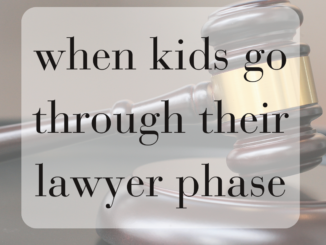I wrote a post about myself, an adult, not freaking out when my children said things that were factually incorrect because I knew they were playing at having that skill. Like pretending to read a sign, or drawing scribbles and then “reading” them to me. The point of my post was that I don’t need to correct my children constantly in play and tell them “That’s not actually what that says” or things like that, because…they’re playing. They’re learning. Me correcting them only disrupts our relationship, the thing they were hoping to share with me.
Someone asked, very reasonably so, in the comments about what to do with this when *you*, the adult, know how to go unbothered…but an older sibling doesn’t know how to let their younger sibling be “wrong” without being bothered. Because the older sibling is coming from a childish and limited perspective too, and they can’t see that the little one is playing…all they can see is that they’re WRONG!
This was my answer:
I don’t know how old the sibs are, but I was this older sibling my entire life. It felt very frustrating to feel like I knew that something was literally wrong, incorrect, factually untrue, lying, etc…and for the adults around me to brush it off as if it didn’t matter.
I mean, maybe in adult terms it didn’t matter — and obviously I didn’t understand child development of my little siblings! — but to me it felt like “What the heck, I value truth and justice and accuracy, why is no one else around me valuing it too????”
I wonder whether “leaning in” to that with your older child might help? You could pull them aside to talk about it somewhere where it’s not bothering little sib, keep patiently listening and empathizing, and then offer suggestions based on the specific situation after they truly feel heard.
I wonder if they feel like they have to be the one “holding down the fort” — enforcing truth and justice and accuracy — since it might seem to them like the adults around them don’t care. (Even though you obviously do care! Since you’re asking me! But that might not reflect their feelings.) Like the more you say “just let it go,” they have to dig in even harder, because to them, the world obviously has a Right and a Wrong and if the adults won’t even care about that or see that, then they just have to entrench themselves even further in it to make sure that at least somebody is protecting the Right and the Wrong.
Maybe if they felt super duper listened to and like you took what they were saying was important…like…10x as much as you tell them why it’s actually not important…then maybe they wouldn’t feel like they have to be the enforcer of it as much, and they’d lay off younger sib after awhile?
Mine are pretty young — 5 and 3 — and both have slightly or moderately delayed language skills, so my direct experience in this as a parent is limited. But I do a lot of echoing back to each of my kids what they’re saying, and accept that they might still be in conflict after that, or they might move on. Apollo gets super offended that Summer is not actually reading correctly, for example.
S: That says “Summer!”
Me: Oh, yeah?
A: It does NOT. That is G. That says “guh”.
S: NOOOO! S FOR SUMMER!!
Me: Oh, yeah, you’re right, Apollo. It is a G, you learned that at school huh?
S: It’s S for Summer!
Me: Oh Summer you’re thinking of how the first letter in your name is an S?
S: Yeah!!!
A: That says G!! Like grape!!!
Me: Oh yeah, G is the first letter in grape! Good thinking!!
…etc, etc. It does get exhausting, and it’s not like the two of them resolved the conflict or even really understood what each other was talking about, but it’s like I held two conversations at once to try to affirm what each of them was doing (one of them being factually correct; the other one playing, and being sort of correct, just in different ways.) Because neither of them are doing anything wrong. They’re just not currently doing the same thing, and they don’t have the skills yet to recognize that the other person might be doing something else and shift their play to match that.
It’s part of a broader theme when my kids fight of reminding myself that I’m on nobody’s side (or to put it more positively, that we’re *all* a team). I am neither on “Team Protect the Younger Sib Who’s Just Playing” nor am I on “Team Side with the Older Sib who’s Factually Correct”. My goal is to make sure that both of them feel like they are understood by me, even if they’re not by one another, since I can’t manage their relationship with one another, only their relationship with me.



